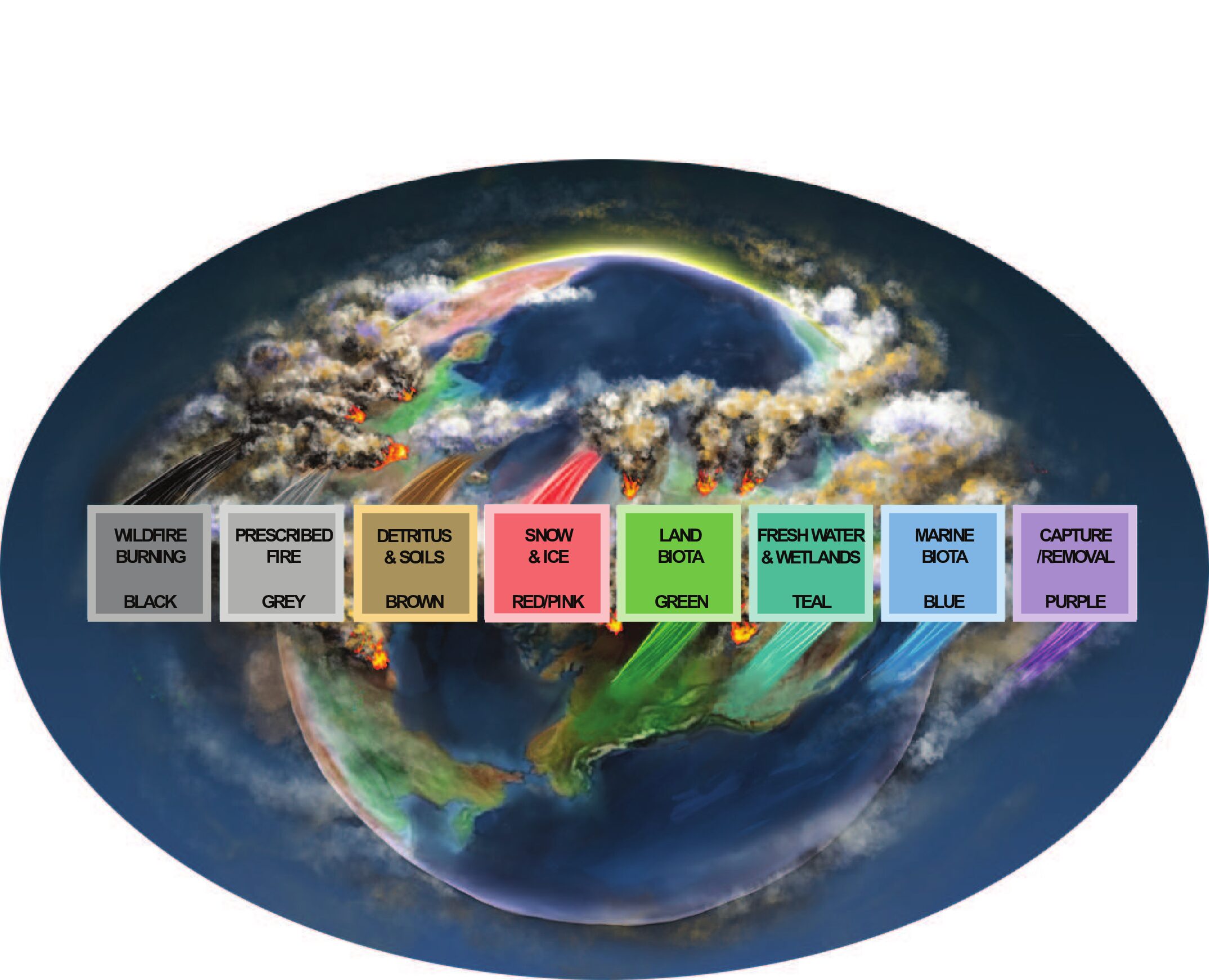Reflections from the Fire Science Learning AcRoss the Earth System (FLARE) Workshop
Fire is a key component of the Earth System, modified by, and impacting on human activities. It shapes and regulates terrestrial ecosystems (Pausas et al. 2020), but also drives changes in weather, climate (Hamilton et al. 2018), carbon (Lasslop et al. 2019), and nutrient cycling (Perron et al. 2022) through the many complex interactions of fire and its emissions in the Earth System. From land to ocean, from vegetation to human society, and from the past to the future; fire is a truly transdisciplinary research topic.
Although fire is an integrated component of the Earth System, integrated research across disciplines, institutions, and fire practitioners is currently lacking. As a result, it is difficult to obtain the much-needed holistic understanding of how rapid changes in wildfire activity will impact ecosystems and society in the coming decades.
Diverse expertise from across the geosciences and social sciences is needed to fully appreciate and identify the main challenges in fire science. The changing trends in fire intensity and its spatial reorganization, in response to climate change, are altering the interactions between fire and other components of the Earth System, including society (Kala et al. 2023). This clearly signals an urge for better communication between scientific, societal, stakeholder, and government representatives.
To address this need, the ambition of the FLARE (Fire science Learning AcrRoss the Earth system) workshop was to gather a transdisciplinary international panel of researchers and fire practitioners. Participants discussed the challenges in understanding fire behavior and its impacts across the world and over varied timeframes, the tools that we have, and the need to address these challenges, as well as how to better communicate across disciplines. The goal is to synthesize this knowledge and formulate a roadmap for more integrated wildfire research over the next five to ten years.
Held from 18–21 September 2023, FLARE gathered experts from disciplines across the Future Earth global research network. Expertise in physical and social science, remote sensing, fire communicators and artists, operational fire scientists, and fire managers were all present. Participants represented 14 countries, and both early-career and gender equity were achieved overall. The workshop was held in a hybrid format, with 15 onsite participants invited to meet at the Bermuda Institute of Ocean Sciences (BIOS, https://bios.asu.edu) and 22 participants online. The 4-day workshop included lightning presentations from each participant, 20 keynote talks, lively discussions, and 4 in-depth breakout sessions.
The workshop highlighted a poor constraint on “impacts of fires on the Earth System” which stem from a lack of communication between relevant fields of expertise. In particular, a disconnection was identified between the scientific aspect of fire and the societal implications of fire events. Workshop participants identified three main challenges that need to be addressed by the global fire community:
- Unifying transdisciplinary research around common boundary objects, starting with “Fire’s role in the carbon cycle” (Challenge 1);
- Better characterizing “Fire and extreme events” (Challenge 2);
- Taking a holistic approach to understanding “Fire interactions with humans” (Challenge 3).
The FLARE workshop also included an onsite public engagement event organized by the US Consul General Office of Bermuda. Dr Ben Poulter (NASA) visited students at the Warwick Academy to discuss NASA’s role in Earth science, climate change, and blue carbon ecosystems. Additionally, fire-science illustrators Miriam Morrill and Jessie Thoreson captured the transdisciplinary collaboration process during the workshop, characterising the carbon cycle as a potential boundary object for collaborative global fire science connectivity (Fig. 1).

Ongoing work now addresses the identified challenges, and by the start of 2024 a roadmap for coordinated wildfire research, in the form of a white paper, will be produced. As part of the white paper, FLARE plans to include a dedicated early-career researcher perspective on the workshop and its outcomes, as well as recommendations for inclusive fire science across different communities.
ACKNOWLEDGEMENTS
FLARE received funding from ESA and Future Earth, via their Joint Program (https://futureearth.org/initiatives/funding-initiatives/esa-partnership), PAGES, North Carolina State University (Hamilton’s start-up), and BIOS (https://bios.asu.edu/).
REFERENCES
Hamilton DS et al. (2018) Nat Comms 9: 3182
https://doi.org/10.1038/s41467-018-05592-9
Kala CP (2023) Nat Hazards Res 3: 286-294
https://doi.org/10.1016/j.nhres.2023.04.003
Lasslop G et al. (2019) Curr Clim Change Rep 5: 112-123
https://doi.org/10.1007/s40641-019-00128-9
Pausas JG, Bond WJ (2020) Trends Ecolo Evol 35: 767-775
https://doi.org/10.1016/j.tree.2020.04.004
Perron MMG et al. (2022) Atmos Res 270: 106084
https://doi.org/10.1016/j.atmosres.2022.106084
Douglas S. Hamilton1, M. M.G. Perron2, J. Llort3, S. Hebden4 and M. H. Morrill5
AFFILIATIONS
1Department of Marine, Earth and Atmospheric Science, North Carolina State University, Raleigh, USA
2Université de Brest – UMR 6539 CNRS/UBO/IRD/Ifremer, Laboratoire des sciences de l’environnement marin (LEMAR) – Institut Universitaire Européen de la Mer, Plouzané, France
3Barcelona Supercomputing Center, Barcelona, Spain
4Future Earth Secretariat, Stockholm, Sweden
5Pyrosketchology, Washington State, USA
CONTACT:
Douglas S Hamilton
DATE
December 13, 2023AUTHOR
Douglas HamiltonJ. Llort
M. M.G. Perron
M.H. Morrill
Sophie Hebden
SHARE WITH YOUR NETWORK
RELATED POSTS
Future Earth Networks Organize Workshop on Impacts of Increased Wildfires on the Ocean and Other Earth Systems
Advancing Planetary Epidemiology through Earth Observations
Future Earth Members to Speak at Past Global Changes Symposium